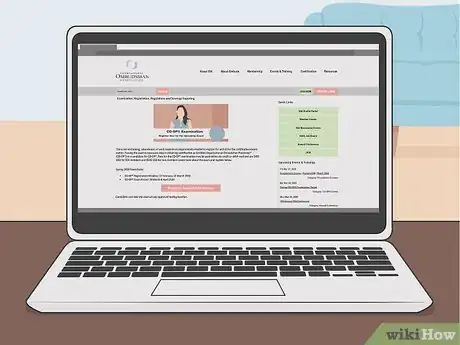This article was co-authored by wikiHow staff writer, Eric McClure. Eric McClure is an editing fellow at wikiHow where he has been editing, researching, and creating content since 2019. A former educator and poet, his work has appeared in Carcinogenic Poetry, Shot Glass Journal, Prairie Margins, and The Rusty Nail. His digital chapbook, The Internet, was also published in TL;DR Magazine. He was the winner of the Paul Carroll award for outstanding achievement in creative writing in 2014, and he was a featured reader at the Poetry Foundation’s Open Door Reading Series in 2015. Eric holds a BA in English from the University of Illinois at Chicago, and an MEd in secondary education from DePaul University.
There are 9 references cited in this article, which can be found at the bottom of the page.
This article has been viewed 18,596 times.
Learn more...
Based on the Swedish word for representative, an ombudsman is a general term for an individual that resolves grievances and handles complaints. While you may find an ombudsman at some private companies, many government agencies have appointed ombudsmen to handle the concerns of constituents. There are also long-term care ombudsmen that work in nursing homes and hospitals to handle the complaints of patients and residents. To become an ombudsman, choose a field to work in, get a college degree, and apply for certification through the state or International Ombudsman Association.
Steps
Becoming an Organizational Ombudsman
-
1Pursue a career as an organizational ombudsman if you enjoy solving conflict. An organizational ombudsman works as a neutral party to assist with conflicts and complaints. As an organizational ombudsman, you mediate formal grievances, help the company operate fairly, and ensure that everyone is treated equitably. Become an organizational ombudsman if you enjoy solving conflicts and want to work for a private business.[1]
- The difference between an organizational ombudsman and a human resources department is that human resources handles compensation, raises, and staff management. Ombudsmen have no control over anything related to the business side of a company.
- Organizational ombudsmen that work in government are hired by elected officials to independently field complaints from a constituency.
- Advocate ombudsmen are a type of ombudsmen that are specifically designed to advocate for one group in a company, typically administrative staff or union workers. This is a specialized type of ombudsmen, and you usually need to have some work experience in that specific field.
-
2Get a college degree in administration, psychology, or pre-law. While a college degree isn’t mandatory, you need a good foundation for your role as a fair arbiter of conflict. Major in psychology or business administration to learn how to handle disputes peacefully in a professional setting. You can also major in pre-law if you want to focus on the legal aspects surrounding fair treatment in the workplace.[2]
- Many ombudsmen choose to get advanced degrees in their specific field once they’ve started their career. However, this isn’t a requirement when you’re starting out.
- A large number of ombudsmen enter the field after changing their career. Ombudsmen come from all different types of backgrounds and jobs. Don’t worry if your work experience doesn’t line up perfectly with your prospective career. There are ombudsmen that used to be teachers, nurses, and sales representatives, to name a few.
Advertisement -
3Take the IOA’s written exams to apply for an organizational certification. The IOA is the International Ombudsman Association, and they’re the only certifying body for organizational ombudsmen. You do not need to take a class, get a recommendation, or have work experience to apply for an organizational certification. Visit the IOA online to sign up for the written exam.[3]
- You can sign up for the IOA certification test online at https://www.ombudsassociation.org/co-op-examination.
Tip: It costs $495-595 to take the certification. They offer a discount for members of their organization. Since joining their organization will make your resume stand out, it’s a good idea to simply join before signing up for the exam to get the discount. Sign up for a membership on their website.
-
4Complete the exam at a remote testing facility to get certified. The exam is multiple choice and will assess your ability to handle problems, behave ethically, and resolve conflicts. It is more of a psychological assessment than an academic exam, so do your best to answer the questions as they make sense to you. If you pass the exam, you will earn your certification in the mail or online.[4]
- These tests are always hosted in private testing facilities.
- The organizational certification is entirely optional. You do not need to have a certification to work as an organizational ombudsman.
-
5Apply for jobs at private companies or government agencies. Go online and look for ombudsmen positions in your area. Find positions with descriptions that match your interests based on what you want to focus on in your career. Send your resume and cover letter to any companies or government agencies that you want to work at and complete the interview before starting your new job.[5]
- Customize each cover letter for the company that you’re applying to. Explain why you’d be a good fit for their company and express interest in seeing the company’s operations.
- As an ombudsman working in government, look out for questions about how to field complaints for public services in the department that you’re applying for. For example, if you’re applying for a position at the department of mental health, get familiar with common mental disorders, like schizophrenia and bipolar disorder.
- Since ombudsmen are typically seen as more neutral than a human resources department, you typically find organizational ombudsmen positions at nonprofit organizations and universities where ethics are quintessential to the organization’s reputation.
Going into Long-Term Care
-
1Become a long-term care ombudsman if you want to work in geriatric healthcare. Long-term care ombudsmen work in nursing homes to ensure that the residents know their rights, are treated fairly, and receive the medical care that they need. They check in regularly with residents and act as an advocate for them. Choose a career in long-term care if you enjoy working in a medical setting and supporting those in need.[6]
- Some long-term care ombudsmen are government representatives and work directly for the state to ensure that nursing homes meet regulations. Other long-term care workers are hired by the nursing home directly.
- If you’re pursuing a position as a long-term care ombudsman, it helps to have a degree in nursing, hospital administration, or pre-med. However, a college degree is not mandatory.
Tip: You have to be certified to work as a long-term care ombudsman. You will need to complete field experience with a mentor and work in a volunteer capacity before they can apply for full-time work. Many long-term care ombudsmen continue to work as volunteers though, since the position is often the first to get cut when a state or private company changes its budget.[7]
-
2Take a certification class through a private company or the state. Long-term care ombudsmen typically have to earn a certification by taking a class operated by the state. This class covers laws regarding the housing and treatment of seniors living in nursing homes. It will also cover conflict management, how to handle irate patients, and how to file the proper documents with your state where you live. Look online to find a course near you and sign up for the class to complete it.[8]
- In some states, certifications are issued by private companies. If this is the case where you live, search online to find a certification program near you.
- These courses are typically free if they’re operated by the state where you live. If they aren’t free, they’ll be incredibly cheap.
- These programs typically take less than 6 months to complete. In some states, certification classes only last a few weeks.
-
3Complete your field experience as a volunteer to get certified. After you complete the class, you will be assigned to work with a practicing ombudsman at a hospital or nursing home near you. Observe them, take notes, and ask questions to get a sense for how they complete their work. After completing some observational hours, you will take over their workload and work as a volunteer. Once you’ve completed your hours, your mentor will fill out a report and send it to the state for your certification.[9]
- You typically have to complete at least 30 hours of field experience, but some states require 60-100 hours of field experience as a volunteer.
-
4Look for positions at hospitals and nursing homes to find a job. Go online and look for long-term care positions in your area. Send a resume and cover letter to any hospitals or nursing homes that you want to apply to. Show up for your interview and prepare to answer questions about mental health, patient rights, and the organization of healthcare.[10]
- At a long-term care interview, prepare for questions about talking to seniors and identifying issues surrounding nursing care.
Working as an Ombudsman
-
1Work to manage conflicts and resolve problems. As an ombudsman, your office is open to complaints. When an employee or customer meets with you, ask them to explain their issue in as much detail as possible. As they speak, write the details of their complaint down and explain that you will handle it. If the issue is a conflict with another employee, set up a mediation meeting with both of the parties to peacefully lead them through a resolution.[11]
- For example, if one employee is upset that another employee has been rude to them, sit down with both of them and ask the rude employee what provoked the behavior. Give each person time to speak and work through the issue until both parties reach an understanding and can move on.
Tip: As an ombudsman, you do not handle most grievances directly. Instead, you take the complaint to the proper department. For example, if an employee complains that their paycheck was wrong, take your information to the billing department and look into the problem. The only time you ever directly handle a problem is when there is an interpersonal conflict in the workplace.
-
2File reports to document conflicts in your workplace. Whether you’re at a nursing home or government office, you’re going to need to file a lot of paperwork. Every time that someone files a complaint, fill out your company’s documentation form and file the paperwork. This documentation is extremely important if a complaint is ever elevated to the level of a lawsuit or legal claim.[12]
- This process is different at every corporation, government agency, and nursing home, so follow your company’s instructions on how to file the necessary paperwork.
-
3Solicit feedback from patients and employees about their experiences. One of your additional responsibilities is to ensure that the culture and morale at your institution remains positive. Create surveys to solicit feedback from the people that you work with to ensure that management is handling their responsibility to run a positive work environment.[13]
- Even informal conversations with other employees can help you determine what the state of the company’s workplace is.
- Ombudsmen typically need to submit reports to management on the health of the company’s culture.
-
4Check in regularly with patients as a long-term care ombudsman. The major difference between organizational and long-term care ombudsmen is that long-term care workers have a duty to check in regularly with patients. Create a roster of the patients under your purview and create a schedule to sit down with them weekly or biweekly. Ask them how they’re doing, document their concerns, and follow up on any formal complaints that they have by addressing the appropriate department.[14]
- For example, you may visit with a nursing home resident and they may complain that the staff isn’t letting them take long walks outside. It then becomes your duty to meet with the staff, ask why the resident isn’t allowed to take walks, then return to the resident and explain the reasoning.
References
- ↑ https://ioa.memberclicks.net/what-is-an-organizational-ombuds
- ↑ https://careertrend.com/facts-6776207-ombudsman-job-description.html
- ↑ https://facultyombuds.ncsu.edu/nc-state-faculty-staff-ombuds-obtains-certification-certified-organizational-ombudsman-practitioner-co-op/
- ↑ https://www.ombudsassociation.org/faqs
- ↑ https://www.dcms.uscg.mil/Our-Organization/Assistant-Commandant-for-Human-Resources-CG-1/Health-Safety-and-Work-Life-CG-11/Office-of-Work-Life-CG-111/Ombudsman-Program/Command-Cadre-Toolkit/Selecting-an-Ombudsman/
- ↑ https://apps.hhs.texas.gov/news_info/ombudsman/become-an-ltco.html
- ↑ https://www.desmoinesregister.com/story/news/2017/08/23/budget-cuts-end-watchdogs-visits-iowa-nursing-homes-cuts-iowa-long-term-care-ombudsmens-office-end-w/589646001/
- ↑ https://apps.hhs.texas.gov/news_info/ombudsman/become-an-ltco.html
- ↑ https://apps.hhs.texas.gov/news_info/ombudsman/certifiedombudsman/certificationtraining/AnswerGuide.pdf
- ↑ https://www.dcms.uscg.mil/Our-Organization/Assistant-Commandant-for-Human-Resources-CG-1/Health-Safety-and-Work-Life-CG-11/Office-of-Work-Life-CG-111/Ombudsman-Program/Command-Cadre-Toolkit/Selecting-an-Ombudsman/
- ↑ https://www.ombudsassociation.org/what-is-an-organizational-ombuds
- ↑ https://www.ombudsassociation.org/what-is-an-organizational-ombuds
- ↑ https://www.ombudsassociation.org/what-is-an-organizational-ombuds
- ↑ https://apps.hhs.texas.gov/news_info/ombudsman/certifiedombudsman/certificationtraining/AnswerGuide.pdf








































































